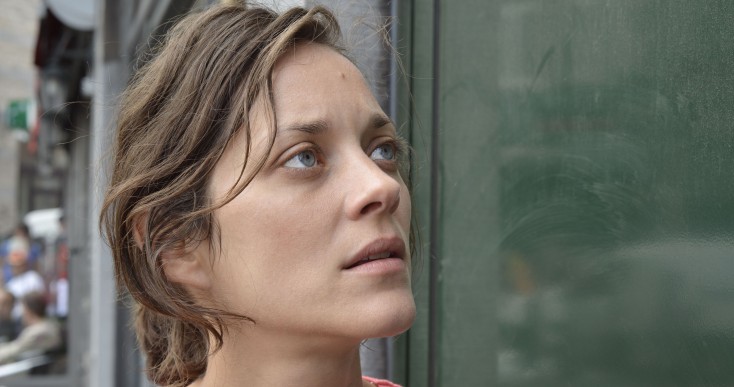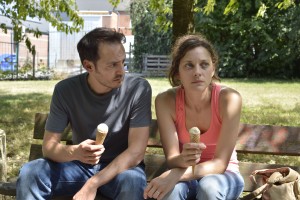By ANGELA DAWSON
Front Row Features
HOLLYWOOD—Marion Cotillard, the actress who won an Oscar in 2008 with her depiction of French diva Edith Piaf, is again attracting some serious awards consideration with her depiction of working class manic depressive who takes it upon herself to save her job at a small business when facing termination in “Two Days, One Night.”
The 39-year-old was in town recently to promote the Belgian film, written and directed by twin filmmakers Jean-Pierre and Luc Dardenne. She explains that she was captivated by the script about a suicidal women’s journey back into the world having read about a rash of suicides in Europe during the economic downturn.
“It really brought back all these questions and reflections that I had, and it made sense for me to experience from the inside someone who feels useless and worthless,” the brunette beauty says, dressed in an elegant Stella McCartney ensemble.
As Sandra, she is a working class mom in suburban Belgium. After an unspecified breakdown, she returns to work to find out that management has decided it can do with one less employee, and has left it up to the remaining workers to decided whether to accept a small bonus if she is canned or allow her to return to work whereby they would receive no bonus. They have the weekend to decide before a Monday vote.
Sandra, with the help of husband (Fabio Rongione), races against time to convince each of her co-workers to sacrifice their bonus in order for her to keep her job. She travels to each one’s home to try and win their support. With each encounter, Sandra is brought into a different world with unexpected results while her fate hangs in the balance. Sandra, herself, is transformed by the experience.
“Two Days, One Night” is the official Belgian entry for this year’s Academy Awards. Cotillard says she is delighted that the small Belgian film has been getting positive notices.
[private]
Q: This movie is kind of like a road movie but also a reawakening of love between a couple, whose marriage has been strained. How did you see this film when you read the script?
Cotillard: When I first read the script, it resonated with some deep questions and reflections I had a year and a half before when I read a letter from someone who had decided to end his life because he was working in a company. At that time, a lot of people in that company took the same decision as this guy so it was a big thing in France. One of them left a letter explaining that he was putting an end to his life because he felt useless. Another person had kids too. I started to really question—I mean I’ve always questioned our society and the decisions and how it dysfunctions—I was reading at the same time things about Indian and African tribes where never an individual in those tribes questioned his or her place in society, so I came to the conclusion that our (Western) society has created isolation and this question that should sound crazy in the perfect world where everybody on earth has a place otherwise this person wouldn’t be here.
Q: How did the rehearsal process help nail the subtleness of playing a working class mother?
Cotillard: Rehearsals always help because … I remember when I started out as an actress I read this biography from Romy Schneider, this genius actress, and at the beginning of her biography she said she always worked a lot on preparing for a role. She was kind of a model for me. She is still. She said, I’m going to work on character and I’m going to explore 50 ways. Most of the time the first way is the right way but it’s enriched by exploring the 49 other ways.
When you have the time to rehearse you try things and you can go wrong because you’re not shooting, and the next day you’re going to try something different, and it’s going to be richer because you’ve experienced it. It may not be exactly what you were looking for but you’ve experienced it. I always need preparation time because I love it. I love the process of exploring. When you find something it’s like when you’re searching for gold you have the gold and suddenly it’s like, “Wow, that’s it!” And you have time to digest it and make it better.
Q: Was it difficult to do the Belgian accent?
Cotillard: Yes and no. I didn’t want to have a Belgian accent. I wanted to have a flavor. I needed it because all the other actors and especially the actor who plays my husband and the two young actors that play my kids have an accent. One of the first things the Dardenne brothers asked me to do was lose my Parisian accent. When you’re asked such a thing—James Gray wanted me to have a Polish accent (for “The Immigrant”) and Guillaume Canet wanted me to have an Italian accent (in “Love Me If You Dare”)—so, for this, I thought, “I have to lose my French-Parisian accent but I need to replace it with something.” We all have accents or we’re robots.
We had a month of rehearsal, which was very helpful because I was able to listen to all the (Belgian) people around me, who had different accents. I was kind of nervous that it would be too much or not enough because I was working by myself; no dialect coach this time. Sometimes I got a little nervous about it. Sometimes the Dardennes would ask me to dial back the accent because some people in the audience already know my face. I knew I needed to fit in to their world but the accent shouldn’t be disturbing for the audience.
Q: Is there a key element when you’re going from scene to scene that you’ve discovered over the years?
Cotillard: A good director. That’s the key. Sometimes, I don’t want to give because I don’t trust the director. It’s really really hard for me to give anything or to find the authenticity or anything I need to give everything I have to give to a scene. That’s the first thing. Then, if I feel free and if there’s a strong connection with the people I work with, it’s not hard for me to stay in the character. Sometimes I know I need a process. I need time by myself before the day. When I did “La Vie En Rose,” for example, I always came an hour before the call, because I needed the hour to do stuff to get in. When I feel free and trusted and I trust the people I work with, it’s simpler.
Q: You said you go so deep into a role sometimes…
Cotillard: Well, I try to…
Q: Was it difficult to come out of playing Sandra?
Cotillard: The thing is as much as I find the process of getting in interesting, I also find the process of getting out very interesting too. I didn’t know before “La Vie En Rose,” that I would have to find a way out. I thought it was a job and that after the last cut, I’d go back to my life and go back to normal. What is normal anyway? That was a very interesting process that took me a long time and then I realized I needed to do it for almost all my movies. I never know how it’s going to happen so I’m always looking for this experience. It can take the form of someone who will tell me something and then suddenly I’ll feel like (the character) is going away. But I learn a lot out of it. It’s hard to explain. And I never know how it’s going to happen.
Q: How was it working with the Dardennes? What are you looking for in a director?
Cotillard: I need to work with directors who need more than anything to tell a story. With the Dardenne brothers, I loved everything. This is one of the greatest experiences if not the greatest experience I’ve ever had on a set with directors, and my relationship that I had with them was total osmosis. They always talk about the audience. Sometimes on movie sets “audience” is like a bad word. But the Dardennes always talked about the audience and that what I love about their movies, because they take you somewhere and they’re going to surprise you and they’re going to move you. I’ve seen all of their movies and I’ve loved them all.
On the second day of rehearsal, they were talking about the audience. It was funny because it was really new for me. It was really like a little more freedom. They’d already given me freedom beyond freedom, and I loved it so much. They told me they always think about the audience, and in this one, they told me they didn’t want the audience to see my face as the film opens. I found it relieving. (She laughs.)
Q: What are you doing now?
Cotillard: I did a British movie based on “Macbeth.”
Q: Is it the traditional telling?
Cotillard: It’s super-traditional. We went to the purest Shakespeare you could find. Sometimes they adapt it a little bit for people to understand. If you don’t, it’s normal. (She laughs.) It took me a long time to understand, but I’m French.
[/private]






